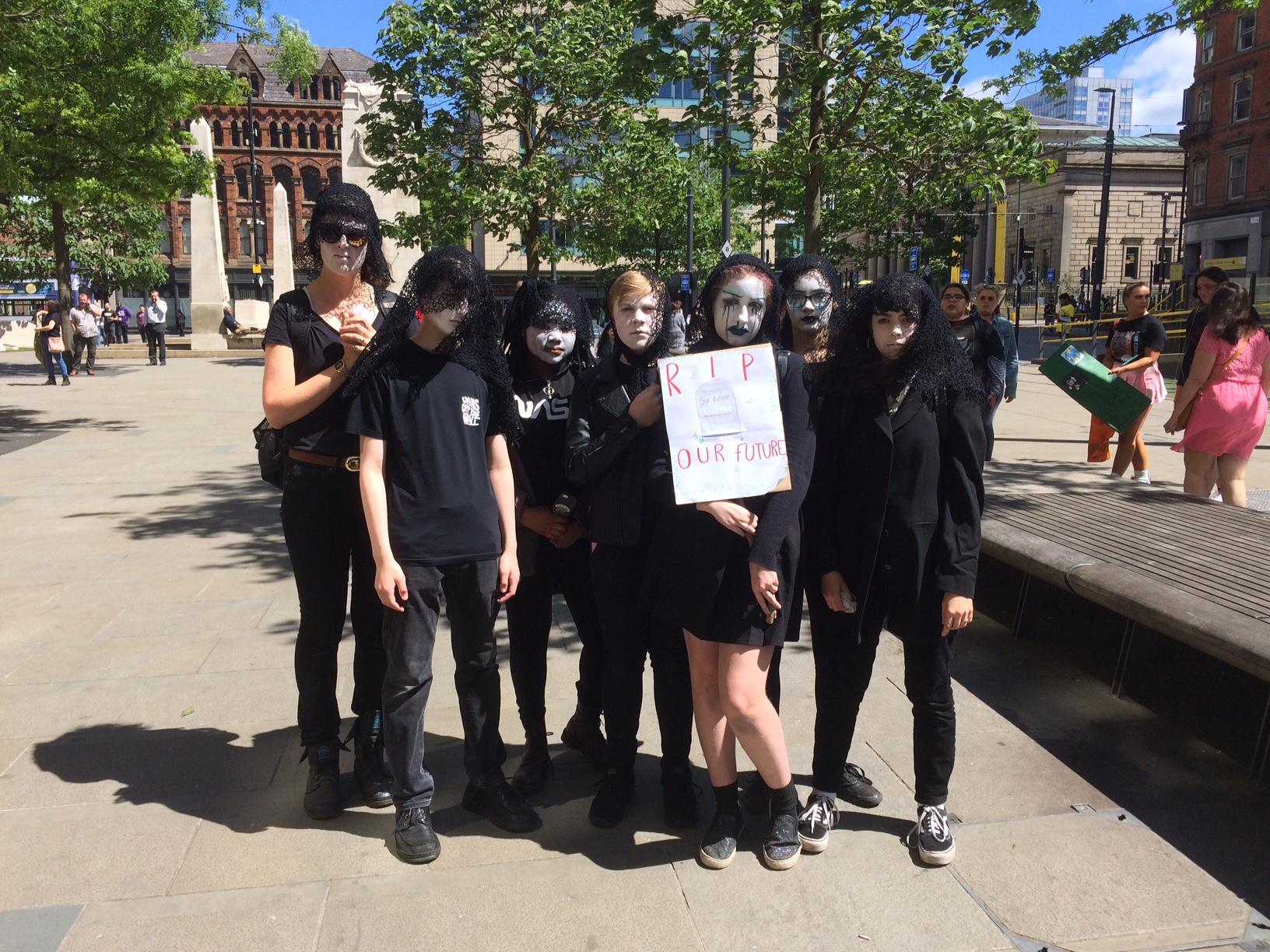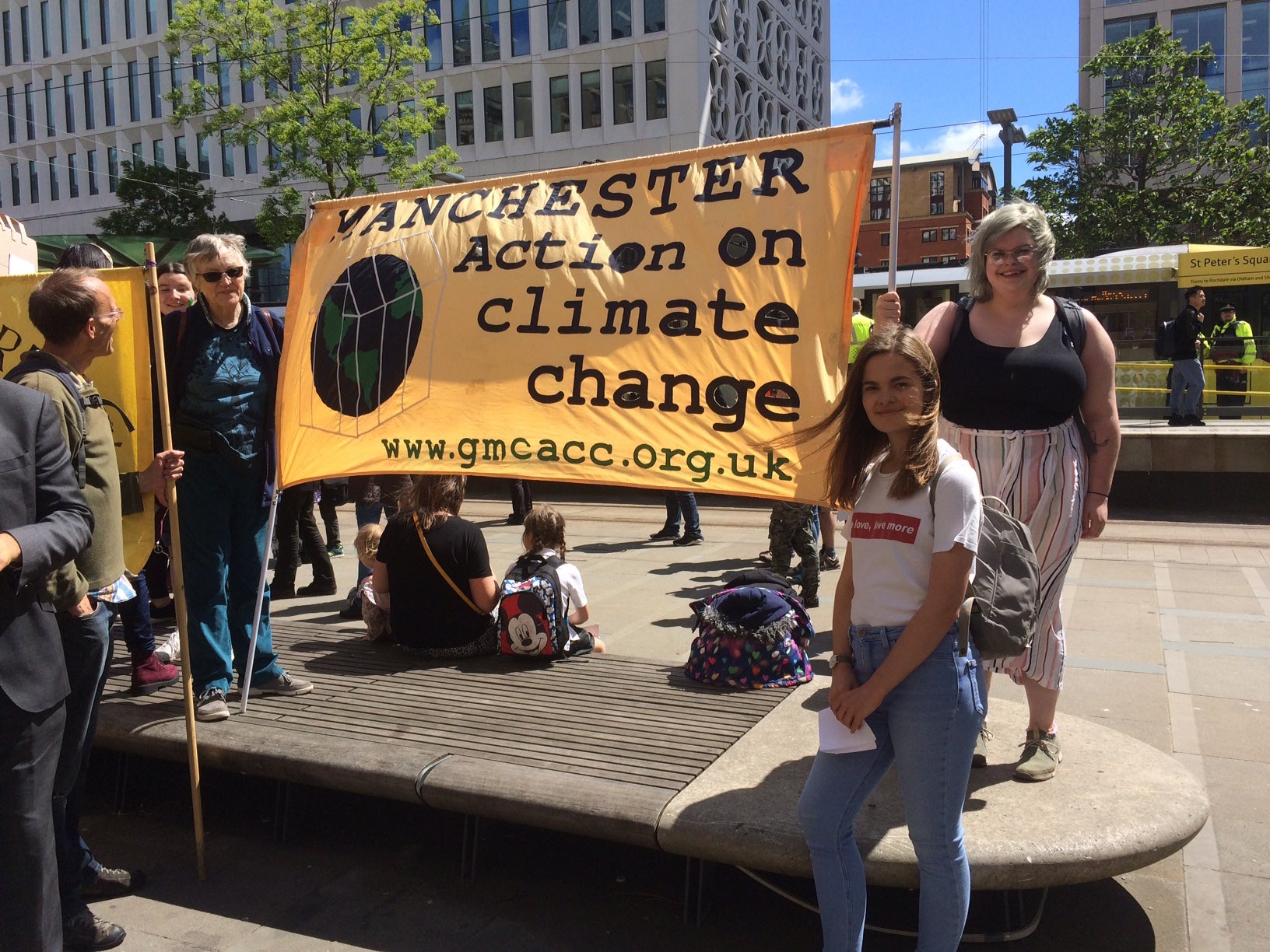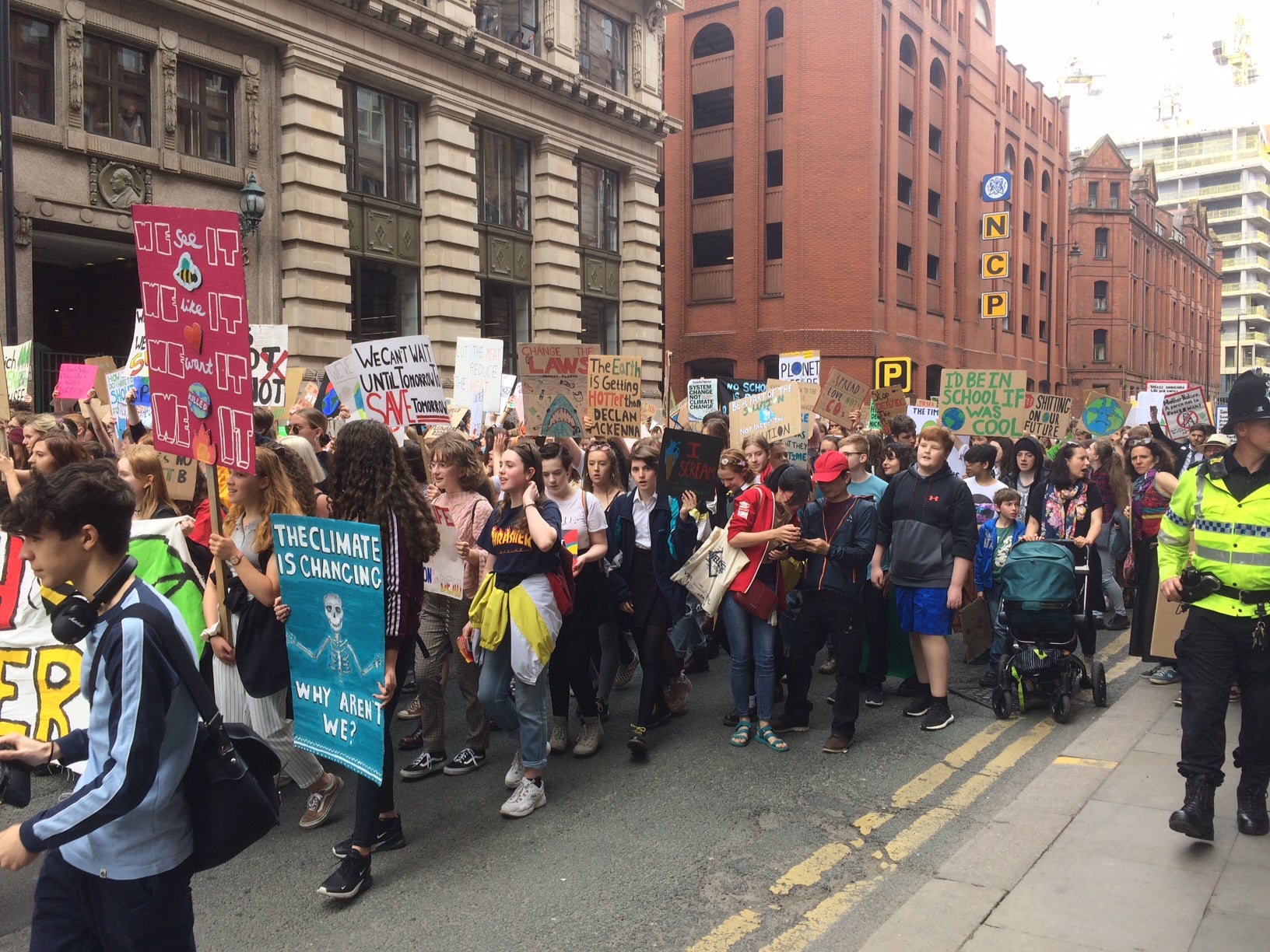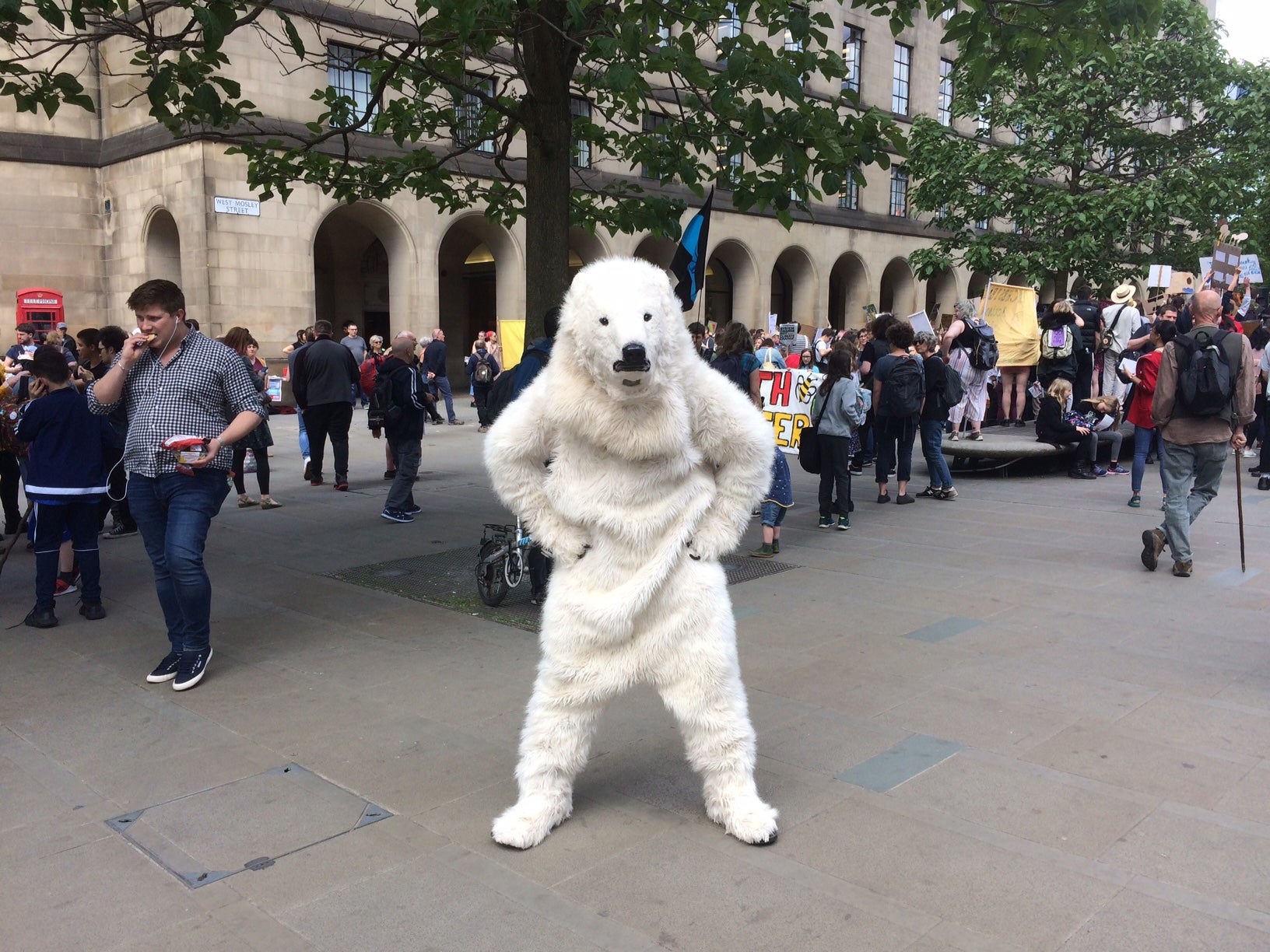A fight for the future as climate change school strikes grow for fourth month running
An estimated 4,000 teenagers and young people turn out in Manchester – and another 1.5m around the world – to demand they inherit a planet that is not dying

Your support helps us to tell the story
From reproductive rights to climate change to Big Tech, The Independent is on the ground when the story is developing. Whether it's investigating the financials of Elon Musk's pro-Trump PAC or producing our latest documentary, 'The A Word', which shines a light on the American women fighting for reproductive rights, we know how important it is to parse out the facts from the messaging.
At such a critical moment in US history, we need reporters on the ground. Your donation allows us to keep sending journalists to speak to both sides of the story.
The Independent is trusted by Americans across the entire political spectrum. And unlike many other quality news outlets, we choose not to lock Americans out of our reporting and analysis with paywalls. We believe quality journalism should be available to everyone, paid for by those who can afford it.
Your support makes all the difference.It is a hot, sunny day in Manchester and 14-year-old Carmen King is dressed in full black funeral garb, complete with veil and thick white face paint.
“It’s pretty warm,” she says of her outfit. “But then, if adults don’t get it sorted, it’s only going to get hotter anyway.”
The year nine student was one of some 4,000 children, teenagers and young people who flooded into the city centre on Friday to protest against climate change.
They themselves were among an estimated 1.5 million-plus youngsters doing the same in hundreds of towns and cities across the world: in London, Paris and Berlin, of course, but, crucially, in the provinces too, in places – like Manchester – where the battles for hearts and minds are often truly won.
They went on strike from school classes and university lectures, as they have done one Friday a month since February, to demand adults do just one thing: save the planet and their futures.
“No one’s here because they enjoy protesting,” said Carmen, one of six friends and an adult mentor from the city’s Z-Arts drama school who donned mourning attire to symbolise the death of Earth. “I’d rather be at school – well, probably – but this is too important. What’s the point of going to lessons when we’re not going to have a future if things don’t change?”
How did her teachers feel about her absence, I wondered?
“Pretty mixed,” she noted. “Some think we shouldn’t be here. But then I think they shouldn’t have allowed the planet to be destroyed.”
Well, touché.
This was pretty much the gist of things during three hours of demonstrations and a mile-long march: that previous generations had allowed the planet to be brought to the brink of climate calamity, and now this generation was demanding – politely and with good humour, it should be said – a national emergency be declared to address the issue.
“This isn’t going to go away and we’re not going to stop putting the pressure on for real structural change because we have no other choice,” said Emma Greenwood, 15, vegan, feminist, and the coordinator behind the Manchester protest. “I think, as young people, we’re realising the power we have if we come together and form a global community, and I’ve no doubt that we’ll keep doing this as long as it takes to get the action that’s needed to finally address climate change.”

Nationally the strikes have been coordinated by the UK Student Climate Network and come partially in response to a UN report in October, which stated the world’s carbon emissions needed to be halved within 12 years to prevent some of the severest effects of global warming – flooding, droughts, mass displacement – becoming inevitable.
But, because this month’s protest coincided with exam season, there were some expectations that numbers may be down. They decidedly were not.
“There’s actually a physics GCSE today, which pretty much means no year 11s turning up at all,” said Emma, a youth MP for her home town of Bury. “But this is still the biggest turnout yet.”
She thought about it for a second. “Ironically, that might be to do with the weather,” she conceded. “No one wants to protest when it’s raining. But I do think we have momentum on our side.”
Talking to her to reminded me a little bit of an interview I once saw with James Van Der Beek.
The star of Dawson’s Creek (bear with me) was asked if he and the rest of the cast, being in their late 20s, had to dumb down to play the show’s famously sophisticated high school students. No, he joked, “with these kids, you have to step up.”
So, too, with many of those at Friday’s protest.
In conversation, many offered considered and thought-out policies, which they believed would help decarbonise the UK economy: subsidies for renewable energy companies, integrated public transport with Europe to reduce flight numbers, citizens’ assemblies and the reversal of Brexit (inevitably mentioned) were all among ideas suggested.

So, too, were demands for votes at 16 and a complete overhaul of education to place climate crisis at the heart of all learning, from early years to FE colleges.
“So we grow up with the tools and the skills needed to deal with the disaster we’re inheriting,” said Adam Haigh, a 19-year-old archaeology student from Cumbria.
The demo itself saw a series of youngsters standing on a bench in the city’s St Peter’s Square and making open mic-style speeches to the crowd.
Style varied from rundowns of how individuals could reduce their own carbon footprint to take-downs of politicians, fossil fuel industries and, well, just adults in general. Greta Thunberg, the Stockholm teenager whose own one-girl protest outside the Swedish parliament helped spark this whole movement, was namechecked, of course. So were the suffragettes, as another inspiring movement.

One lad kept his moment on the makeshift stage simple. “Climate change has to go,” he said, then, quite literally, dropped the mic.
Perhaps the youngest speaker was Kirby Brown, a 10-year-old from Widnes. She read a poem she’d written. “I just wanted to say I like the planet and I’d like it to be looked after a bit better,” she told me afterwards.
Mum Claire was there too.
“She asked if she could have the day off to come and I thought it was too important to say no,” Ms Brown said. “It’s the last day before half term anyway, and I think doing this has far greater educational value than anything she’d learn in class today. Actually, I’m very proud of her for wanting to come.”
As we spoke, a teenager passed by carrying a placard that seemed to echo the sentiment: “No school today is better than no planet tomorrow,” it said.
Others signs were just as pointed: “The seas are rising,” said one. “And so are we.”
And that’s how it felt too. Like these now monthly strikes are still just the beginning of something defining, of a shift to a new way of thinking.
Not everyone has felt that way, of course. Headteachers and government ministers, including education secretary Damian Hinds, have previously lectured these youngsters that the best way to tackle climate change is to stay in classes and learn new skills.
But these particular teenagers were not for buying the line and neither was Kate Lewis, a 53-year-old mother of three standing near the back.
“I just wanted to come down and, as an oldie, show my support,” the Unite union official said. “The energy of these kids is so infectious. You look at this and it does make you positive about what can be done.”
If felt, all in all, like the future may be in good hands.
“Maybe,” said 18-year-old student Vivian Macdonald as things started to come to a close around 2pm. “But I was thinking about the future a while ago, about how I’d like to have children and grandchildren, and I suddenly realised how maybe those options wouldn’t be open to me if global warming carried on getting worse. That was what started me wanting to take action, and I think a lot of people feel like that. That’s why this is important. It’s a fight for the future.”
Join our commenting forum
Join thought-provoking conversations, follow other Independent readers and see their replies
Comments